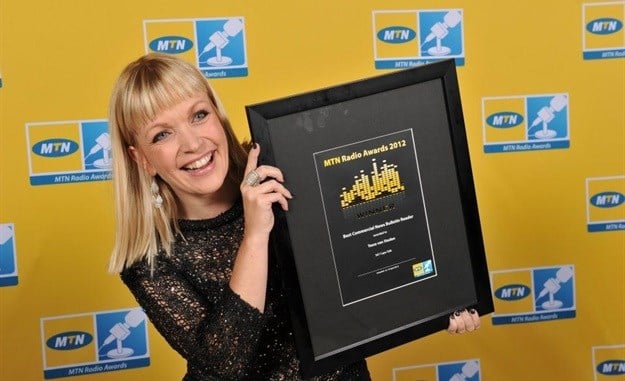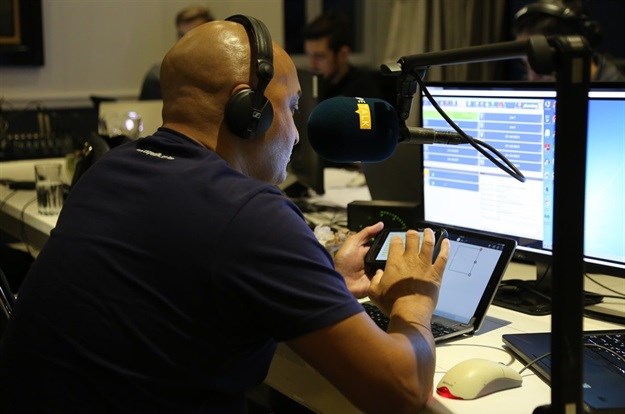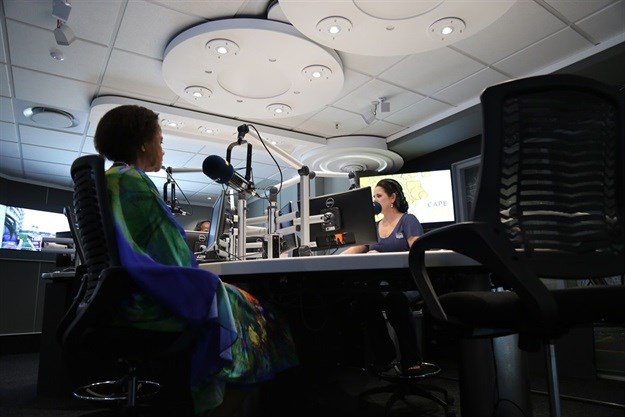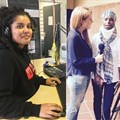Cocreating the CapeTalk conversation in the digital decade
Talk radio is intense as it's largely based on current affairs - and with the rise of social media, there's a deluge of that 'breaking news' information to sift through. You need to be ready to switch focus at the drop of a hat - even while on-air. Tessa van Staden, programming manager at CapeTalk, talks us through the first two decades on air for the only talk radio station on the AM frequency, and how they're moving with the digital times.
Van Staden explains that the bulk of her role entails quality controlling everything that comes out of the speaker, but she is also responsible for training and managing staff, finding new talent and giving existing hosts and teams feedback, approving commercial campaigns, listening to audio and scripts before they go live on air. In terms of content, all the shows use social media quite interactively.

Tessa Van Staden. Images supplied.
So while they’re on air, they ask listeners to call, to SMS, to send WhatsApp voice notes. Social media really has become integrated into the offering. It’s no longer just someone speaking into a microphone or doing an interview. The audience actually co-creates shows in a very real way, every day. That’s how they stay in touch with listeners.
You're probably nodding along as that makes sense for a radio station in today's digital age, but talk radio on AM frequency is chalk and cheese to commercial stations that broadcast on FM frequency. Andre du Toit, CapeTalk’s head of technical elaborates on AM radio’s benefits as follows:
- One single transmitter covers a massive area as opposed to FM, which is basically line of sight.
- Mountainous terrain does not affect AM as adversely as it does FM.
- AM coverage is extended even further at night due to sky waves. People as far as Namibia can receive Cape Talk at night and the station recently received an email from someone who picked up Cape Talk in Lapland, which is approximately 16,000 km away!
- AM has a bandwidth of approximately 7.5kHz and FM approximately 15kHz, which is why AM is really suited for talk radio over music.
- The bandwidth of human speech falls nicely into the AM bandwidth whilst you require at least double that for decent music listening.
Platform understood, Van Staden lets us in on John Maytham’s role at the station since its inception, how their 20in140 campaign is being received and how CapeTalk is incorporating the latest channels of communication into the mix.

Elaborate on the #20in140 campaign and how listeners are reacting to those memories of the iconic stories of the past two decades.
I have been so moved by some of the stories people have shared. With the Planet Hollywood bombing in 1998, for example, we had a listener call in to say that his daughter was the manager on duty that night, and she had stood behind a wall, so she was protected from the blast. He recounted where he was when he got the call and how he and his wife rushed through to wait for her. Her arms were bandaged and she was bloody, they had to take her to hospital…
We had a call from a police reservist who was one of the first two responders on the scene.
DJ Bobby Brown also lists the Planet Hollywood bombing as a standout moment for him:
Truthfully, we get in so many interesting moments. It’s always interesting to hear from listeners and get their perspective on the stories and how they were touched by them. So on the one hand, we are speaking to the newsmakers and the journalists who covered the story, but we are also hearing the more personal stories from listeners. Often, you don’t realise how people are impacted by a particular story.

John Maytham was an actor before turning to radio – elaborate on his success as a host since then.
In a way, he’s considered to be the father of the station, having done its first broadcast. As he is an actor, John is able to use his voice – one of the most important instruments as a broadcaster – to great effect. He’s an audio chameleon. That makes the experience of listening to him always interesting, he’s never boring or staid.
Click here to listen to a short snippet from the station’s first ever broadcast, by Maytham! His intelligence and general knowledge also comes into it, so his listeners respect him. The audience is often aspirational and don’t necessarily have a point of view about something, but listening to Maytham helps them form an opinion.
He has fun on air, and often finds quirky stories – that’s very important as it’s often a foil to the harder news issues and brings variety to the programme. He also sounds genuinely interested. Whether he’s talking about a cookbook or to a new author, he brings interesting information to the conversation because he has done the research. I feel like I’m learning all the way. When I eventually, at the end of the show, get out of my car or tune out, I feel like I’ve gained something.

So your role isn't to merely sit in studio for a set shift. What’s the best and worst part of your day?
The best part of my day is when I hear a magical moment on air. That could be receiving an unexpected call from a listener with a surprising memory or story, or when we have a fascinating interview with experts about something we’ve never had on air before, and somehow that expert’s information or story or contribution sheds light on something. That’s the best part of my day.

Images supplied.
The worst part is crisis managing, sometimes late at night, getting a call 30 minutes before someone is meant to go on air to say suddenly they can’t do their show. We also went through a period in August where we had signal woes, but that’s all been sorted. So the worst part of my day is crisis management, but if I’m honest with myself, I do also enjoy the crisis management aspect. There’s very little about my job that I don’t enjoy.

Images supplied.
If someone does call to cancel, we do have one or two people as standby hosts in our team. On a few occasions we’ve had another team member going on air at 3am if there’s a crisis. We’re a small team and we work really well together and we are in constant communication. I strongly believe in helping others so when you require help in return, they’re eager to assist. It’s happened before that we suddenly have the PM drive show host doing different show and then getting someone else to fill in for him. In these instances it’s a case of musical chairs.

Speaking of 'musical chairs', how do you deal with the constant flood of 'breaking news' in these times of fake news and user-generated content on social media?
We’re very careful where we don’t yet have the facts. If it’s a breaking news story that someone has called us about, but which they have not yet verified - for example - we thank the caller for alerting us and inform them we will have to check their account with the authorities. We won’t necessarily take the call to air, either. The station’s producers function as very important gatekeepers, so only 10% to 15% of the calls make it to air, with about 85% of calls taken behind the scenes. This means our producers do a lot of screening, and if anything seems newsworthy or interesting, we alert Eyewitness News (EWN) and work very closely with them overall, both in Cape Town and in Johannesburg. So we double-check things with them.
Our producers and technical producers are also very good at checking. If someone calls in with something and we know we can’t take it to air yet, we will call the police or disaster management. If someone calls in with an allegation about someone doing something dodgy, we will call to check first.
Sometimes if it’s breaking news on TV – say, for example, the Grenfell Tower collapse in London – sometimes you see something unfolding on television, you’re seeing the visuals of it so it’s verified.
One of the most interesting radio broadcasts I remember was on Friday, when I was still in the news team – I was off that day and driving around but listening in. John Maytham was on air and it was the Ysterplaat Air Show where a pilot crashed into the sea. People started calling the station and what you heard was blow-by-blow coverage of what people were seeing, what had happened, where the plane went down. Someone with a telescope in Fresnaye called, people from Milnerton called in – so you had this very interesting coverage by ordinary radio listeners, who were calling in to tell us what they were seeing.

Images supplied.
Our audience and listeners often become eyewitnesses or reporters. The interesting thing about radio, unlike other mediums, is that its pace and immediacy means we are able to incorporate social media, so there’s no delay. It’s not like we’re only going to print this evening and we can’t include this incredibly powerful voice note, which someone has sent through now. Or if a story is breaking on Twitter now, we’re able to reflect that and it becomes part of the show, to which we then get reaction from listeners. Social media and WhatsApp voice notes, in particular, give our radio programmes more texture.
The challenge for the hosts, at times, is having to respond to a deluge of information in real time. They have a planned show which was set up prior to going to air. But when callers contribute, along with twitter and breaking news, you need to change track while on air. It’s tricky juggling all of that and making changes – while you’re behind the mic – while ensuring it still sounds interesting rather than becoming a hot mess. The producers are integral to and an invaluable part of this process. They are the directors of the programs.
 What’s next for CapeTalk and talk radio in particular?
What’s next for CapeTalk and talk radio in particular?
For Cape Talk, we are very aware that our audience online and on social media is bigger than our terrestrial audience.
We are constantly looking for innovative and interesting ways of getting people who have never listened to the station to sample the station, so watch this space!
















































 Elaborate on the #20in140 campaign and how listeners are reacting to those memories of the iconic stories of the past two decades.
Elaborate on the #20in140 campaign and how listeners are reacting to those memories of the iconic stories of the past two decades. 











